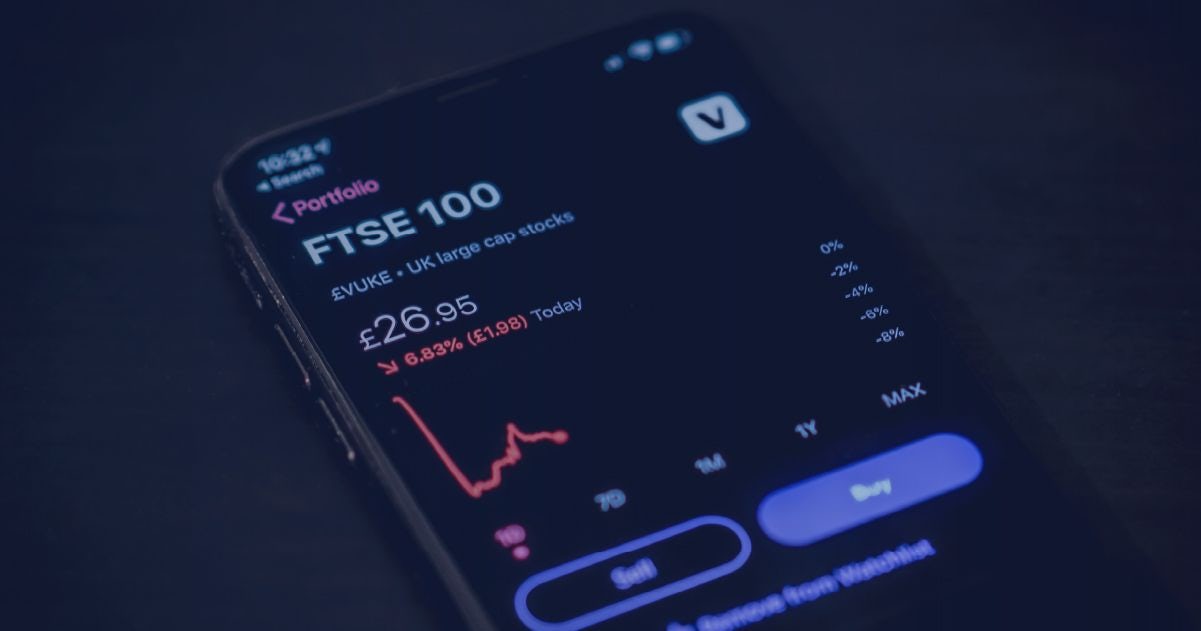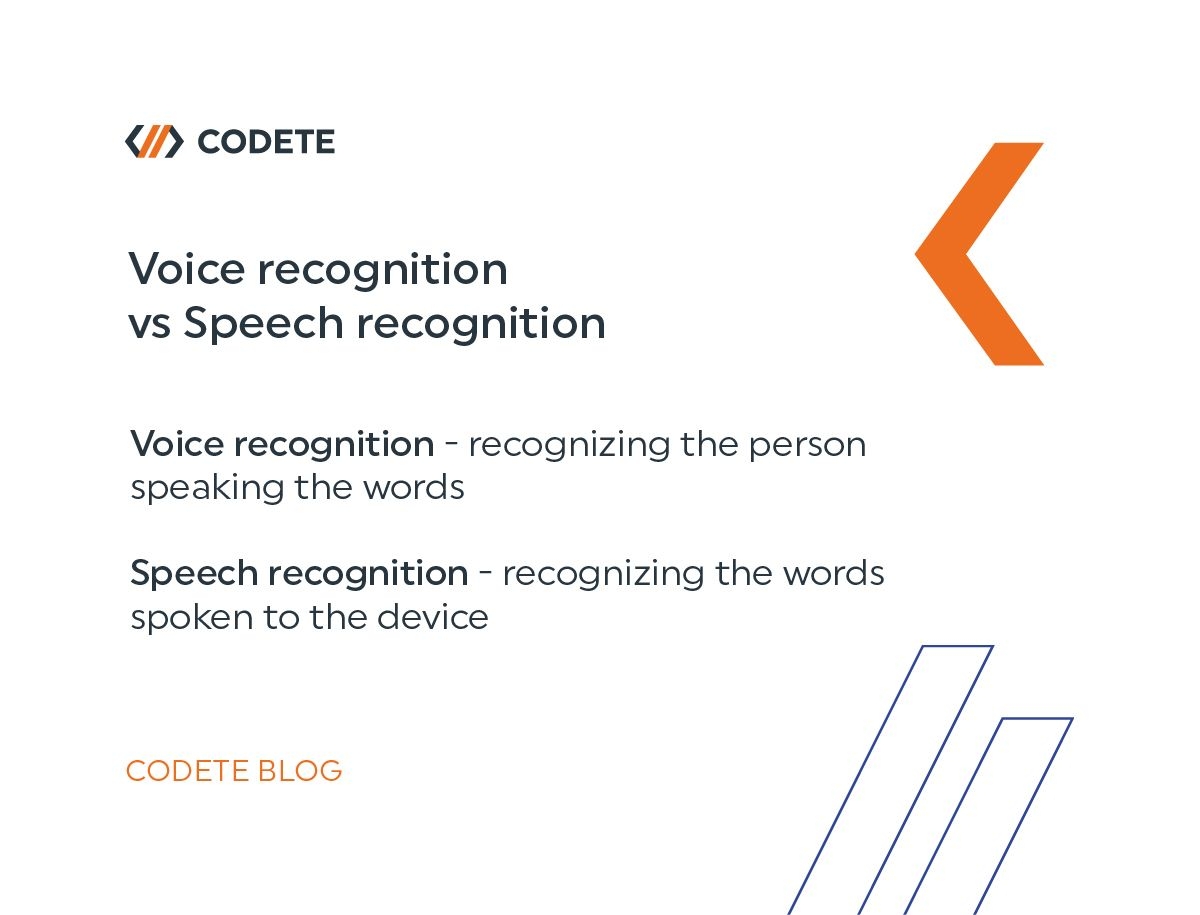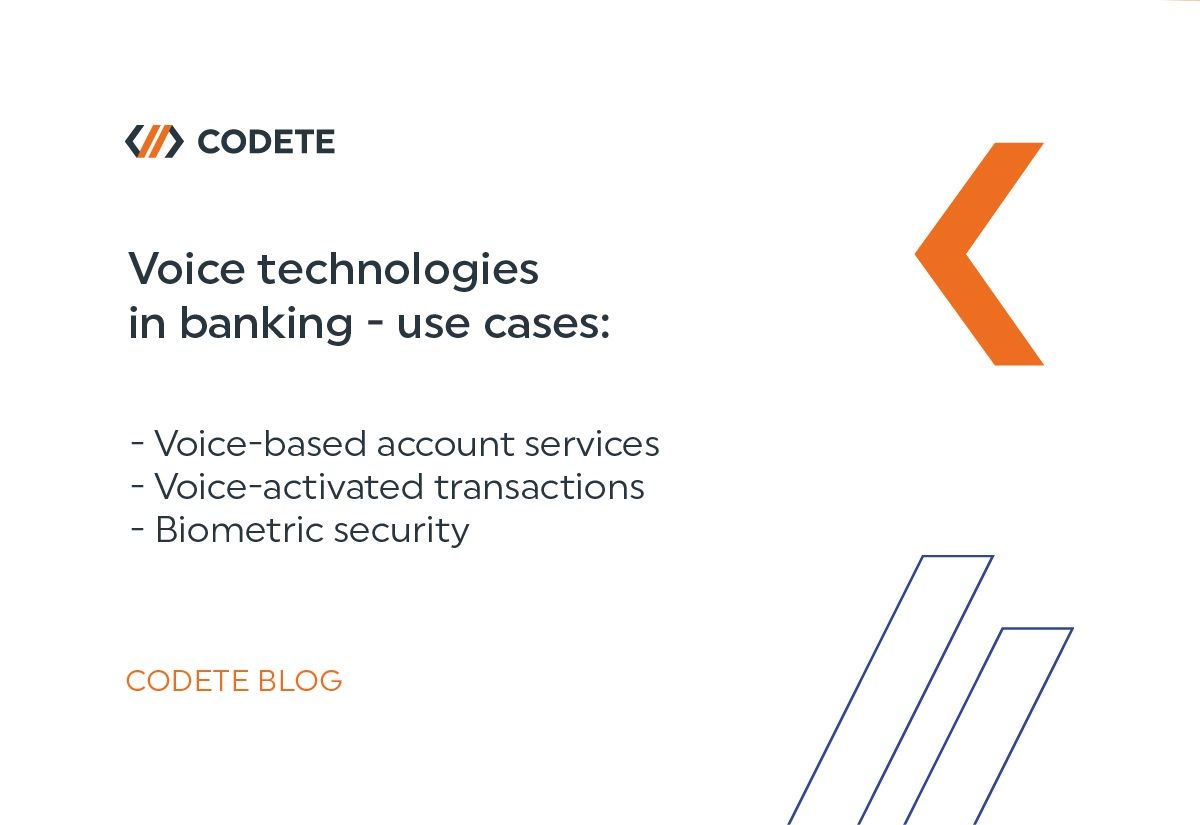The financial services sector is being disrupted by various technology trends today. Since consumers are now used to complete actions by talking to their cars or smartphones, it's only a matter of time before voice technologies become part of the experiences provided by banks to their customers.
Voice and speech recognition systems have already evolved enough to allow businesses to build relationships with consumers in new ways. An increasing number of banks and financial institutions will be using voice and speech technologies to enable their audiences to use financial products easily. Researchers estimate that over 50% of mobile phone searches will be done by voice in 2020.
Read on to find out how banks are now changing their customer experience by implementing innovative technologies that rely on voice and speech recognition.
Table of contents:
- What is voice and speech recognition?
- Example use cases of voice technologies in banking
- Voice technologies in banking – here's how to start
What is voice and speech recognition?
Voice and speech recognition technologies have become a solid trend in the tech scene in the past few years. They power a number of applications that improve customer experience and enhance security. However, the two terms are used interchangeably – and that's a mistake because voice and speech recognition technologies are two different things:
Speech recognition
The main goal of speech recognition is understanding the words being spoken to the device. That's why one of the most important features of such solutions is the ability to remove user idiosyncrasies and detect the words being spoken accurately. The words are then processed by the software to complete actions, carry out commands, or provide a response.
Voice recognition
Voice recognition, on the other hand, aims to recognize the person speaking the words rather than the words themselves. Voice recognition software doesn't care about the language at all, as it's used to confirm the identity of the speaker (speaker verification and identification). A person's voice is in this context used as their unique identifier. An example of their speech is recorded, and then software compares that person's speech to samples in the database to check whether there's a match.
Are banks already using voice technologies?
In February 2019, HSBC became the first bank to use voice recognition in products released to its customers. This marked a leap toward a new direction in biometric authentication for the financial services sector. According to the bank, mobile banking customers no longer have to remember their password and other data to access their accounts.
International banks are now exploring voice technology to increase security measures for their customers. For example, an Interactive Voice Response (IVR) tool can help banks improve customer engagement when using their financial services.
Artificial intelligence technology vendors such as Nuance are assisting banks in establishing speech and voice services. For example, Nuance worked with USAA to launch a voice-activated banking app. It doesn't matter how banks plan to develop their voice-enabled solutions – one thing is clear: artificial intelligence will become essential for banks to deliver better experiences and gain a competitive advantage in the near future.
Example use cases of voice technologies in banking
Now that you know what voice and speech recognition technologies are and how banks are taking the first steps to implement vendor tools, here are the most common interesting and exciting use cases of voice technologies in the financial services sector.
1. Voice-based account services
This is one of the most interesting use cases for voice-based banking. Banks can now build applications that allow customers to use their voice to perform a number of actions, such as checking their account balance, transaction history, and other details.
The Westpac Banking Corporation in Australia launched an Alexa skill to offer voice-enabled services to its customers who use Amazon's assistant. A team from the bank digital lab worked alongside Amazon to integrate their services with Alexa. The bank's users can now check their account details directly from Alexa-supported devices. Moreover, the Alexa skill also allows users to listen to the financial news the bank publishes on their website.
The tool uses Natural Language Processing (NLP) to convert customer questions from voice to text and then automate some of the backend processes required to get an accurate answer. But this is just the beginning. The bank is now working on integrating Google Assistant and Apple Siri with its mobile banking offer. Have a look at this video to see how the bank expanded its offer with voice technologies.
2. Voice-activated transactions
Customers can ask for account details but also perform more meaningful actions. Some banks are already experimenting with voice technologies and add voice-activated features to their applications. That way, customers can complete financial transactions by simply talking to a voice-enabled device.
For example, the global band BBVA operating a subsidiary in Turkey called Garanti recently launched a voice-based assistant called the Mobile Interactive Assistance. The solution allows customers to make financial transactions by simply saying, "I need to transfer money to" and then add the name of the establishment to which they want to transfer the money. The assistant also allows customers to buy or sell foreign currency, find out the exchange rate, and carry out transfers. Moreover, the tool is constantly collecting data about customers to anticipate their future needs better.
3. Biometric security
One of the reasons behind the relatively widespread reluctance to use voice systems is the perceived lack of security. However, voice technologies are now at the forefront of cybersecurity trend in the industry.
In the past, voice authentication products required frequent training to remain accurate. For example, if users didn't engage with a given product for a long time, it was possible for changes to accumulate in their voice that would make identification difficult. This resulted in a frustrating experience. However, new technology vendors are now addressing these issues successfully. For example, Nuance is working on a voice biometric engine that can recognize people by their voice even after very long periods of time.
Biometrics is a solid future trend in the financial services sector, which is constantly on the lookout for security measures that deliver a great customer experience.
Read: Everything You Need to Know About Smart Conversational Banking and Chatbots
Voice technologies in banking – here's how to start
How can banks start to implement voice technologies in their offerings? Here are a few strategic recommendations for organizations looking to expand their offer with voice-enabled services.
- To make the most of the voice technologies, you need to develop and maintain a solid data infrastructure. Otherwise, supporting such solutions will be impossible. You should always make sure that your organization is prepared for implementing a voice-enabled solution first.
- Even if voice assistants are increasingly popular, voice-activated banking services are likely to still be a novelty to most customers. And just like any other kind of new technology, such solutions will need to be introduced with a proper onboarding strategy. Make sure that you include the preparation of explainers and guides as part of your strategy of implementing voice technologies. It's essential that customers know what kind of questions they can ask and actions they can perform using their voice.
- Start small and scale your solution. To achieve success, most banks start to engage in smaller projects such as fetching account details or predicting which questions customers might be asking. Since such implementations require excellent data competency from financial institutions, it's best to build a solution on a smaller scale and then expand it.
- Don't forget about the regulations. Speech recognition services are new but governments all over the world are busy working on new laws and regulations to ensure that both companies and customers are protected. Don't forget that the regulations might differ depending on geographical regions. For example, in China and the US, banks can offer transaction services with voice technologies. In Europe, however, such services are much harder to implement – for example, the banking security standards might forbid voice-enabled financial transactions.
- If you're looking to introduce voice recognition as a security measure, be aware that achieving a secure voice recognition level will take a lot of time, effort, and money.
- Introduce voice-enabled features on different devices. If your customer base uses assistant devices such as Google Now or Amazon Alexa, adding your implementation to these devices, make sense. However, don't forget that some of your customers might prefer to perform banking tasks using their smartphones and their voice-based services. The convenience of the mobile interface is critical for younger generations that are more tech-savvy and appreciate personalized digital services.
The future of voice technologies and banking
There's no denying that voice technologies are on their way to becoming a significant presence in the banking of the future. Since retail has already embraced a variety of voice-enabled offers, it's only a matter of time before banks turn to this option as well. And you can be sure that once they do, voice technologies will become omnipresent in financial offerings.
If you'd like to jump on the bandwagon and gain a competitive advantage now, get in touch with our consultants. Our teams have a lot of experience in providing enterprise customers with AI-powered solutions that deliver voice or speech recognition functionalities. We'll be happy to talk about your project.



